Earlier this week, Facebook announced that it would stop using its facial recognition systems for user authentication on its social platform, although Meta, the now parent company of the social media giant, will maintain the use of this technology for various purposes.
According to a report by AppleInsider, the decision to shut down Facebook’s facial recognition systems will not apply to the other products that are part of the “metaverse”, the new virtual experience announced by Mark Zuckerberg recently.

No doubt this decision proved attractive to online privacy enthusiasts, as the company announced that it would also permanently shut down the systems responsible for DeepFace, the controversial algorithm that automatically identified users in photos. As mentioned above, Meta will continue to use facial recognition mechanisms, as recently confirmed by Jason Grosse, a spokesman for Meta.
Grosse mentions that Meta hopes to find a legitimate and safe use for facial recognition systems in the future, in addition to adding that the company will continue to explore possible scenarios for the correct use of these mechanisms in order to improve the user experience.
Meta will also continue to use a number of biometric tools, including DeepFace, although the company’s plans for implementing this technology in the metaverse have not been specified.
On this metaverse, Zuckerberg presented this new project as a multi-user virtual reality space that is currently accessed through the use of Facebook Portal hardware. Along with some complex avatars, as well as real-time tracking features, the platform opens the door to a new level of user data collection that could go far beyond the current boundaries Facebook is pushing, so it’s best to know as much as possible about this platform before you start using it.
To learn more about information security risks, malware variants, vulnerabilities and information technologies, feel free to access the International Institute of Cyber Security (IICS) websites.
He is a cyber security and malware researcher. He studied Computer Science and started working as a cyber security analyst in 2006. He is actively working as an cyber security investigator. He also worked for different security companies. His everyday job includes researching about new cyber security incidents. Also he has deep level of knowledge in enterprise security implementation.
